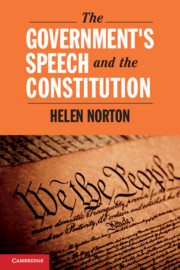Refine search
Actions for selected content:
4 results
6 - The Government’s Speech and Political Contests
-
- Book:
- The Government's Speech and the Constitution
- Published online:
- 12 August 2019
- Print publication:
- 22 August 2019, pp 183-211
-
- Chapter
- Export citation
1 - Determining Whether and When the Government Is Speaking (and Why That Matters)
-
- Book:
- The Government's Speech and the Constitution
- Published online:
- 12 August 2019
- Print publication:
- 22 August 2019, pp 27-67
-
- Chapter
- Export citation
5 - The Government’s Speech, Free Speech, and a Free Press
-
- Book:
- The Government's Speech and the Constitution
- Published online:
- 12 August 2019
- Print publication:
- 22 August 2019, pp 156-182
-
- Chapter
- Export citation

The Government's Speech and the Constitution
-
- Published online:
- 12 August 2019
- Print publication:
- 22 August 2019
